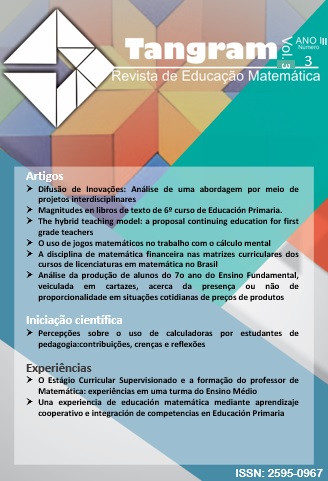Perceptions about the use of calculators by Pedagogy students: contributions, beliefs and reflections
DOI:
https://doi.org/10.30612/tangram.v3i3.11396Keywords:
Mathematics Teaching Laboratory. Mathematical Education. Teacher training.Abstract
This article aims to bring the perceptions regarding the use of the calculator in the Early Years of Elementary Education by students of the Pedagogy course of a Federal University of Minas Gerais. For this, we carried out a calculator workshop at the Mathematics Teaching Laboratory which consisted of four moments: filling in the initial questionnaire, theoretical discussion about the use of this tool, workshop and filling in the final questionnaire. At the end, quantitative and qualitative analyzes were performed regarding the responses obtained in the questionnaires, in order to analyze beliefs and perceptions about the use of this tool, in addition to having a parameter on the importance of a workshop focused on teaching that involves resources the calculator. At the end of this work, we concluded that there was a greater number of students interested in implementing the calculator in the classroom, in addition to all saying that they felt more secure about the use of this tool.Downloads
References
Bogdan, R. C., Biklen, S. K. (1994). Investigação qualitativa em educação: uma introdução à teoria dos métodos. Coleção Ciências da Educação. Portugal: Porto Editora.
Borba, M. de C. (1994). Informática trará mudanças na educação brasileira? Anais do Congresso Paulista sobre Formação de Professores. UNESP. Águas de São Pedro.
Brasil. (1997). Ministério da Educação e do Desporto. Secretaria de Educação Fundamental. Parâmetros Curriculares Nacionais: matemática. Brasília: MEC/ SEF.
Brasil. (2017). Ministério da Educação. Base Nacional Comum Curricular (BNCC). Educação é a Base. Brasília, MEC/CONSED/UNDIME.
Conti, K. C. , Vilela, M. L., Pinto, N. K. D. (2017). Uso da Calculadora nos Anos Iniciais do Ensino Fundamental: concepções dos futuros professores. Cadernos de pesquisa. v. 24, p. 53-67.
Imenes, L. M. P., Lellis, M. (1997). Matemática. São Paulo. Scipione.
Lopes, A. J., Rodriguez, J. G. (2009). Metodologia para o ensino da aritmética: competência numérica no cotidiano. São Paulo: FTD.
Pinto, N. K. D., Conti, K. C. (2018). Anais dos Encontros Mineiros de Educação Matemática: trabalhos sobre o uso de calculadoras. VIII Encontro Mineiro de Educação Matemática – EMEM. Ituiutaba.
Santos, M. A., Jahn, A. P. (2011). Uso da calculadora no ensino de Matemática nas séries iniciais: concepções de um grupo de estudantes de Pedagogia. XIII Anais da Conferência Interamericana de Educação Matemática – CIAEM. Recife.
Selva, A. C. V., Borba, R. E. S. R. (2010). O uso da calculadora nos anos iniciais do ensino fundamental. Coleção Tendências em Educação Matemática. Belo Horizonte: Autêntica.
Smole, K. S., I., Cristiane A., CHICA, C. R. (2019). Usar ou não a calculadora na aula de matemática? Recuperado em 21/04/2019, de http://mathema.com.br/reflexoes/usar-ou-nao-a-calculadora-em-sala-de- aula/.
Van De Walle, J. (2009). Matemática no ensino fundamental: formação de professores e aplicação em sala de aula. Tradução de Paulo Henrique Colonese. 6ed. Porto Alegre: Artmed.
Downloads
Published
How to Cite
Issue
Section
License
Authors must accept the publication rules when submitting the journal, as well as agree to the following terms:
(a) The Editorial Board reserves the right to make changes to the Portuguese language in the originals to maintain the cultured standard of the language, while respecting the style of the authors.
(b) Authors retain the copyright and grant the journal the right to first publication, with the work simultaneously licensed under the Attribution-NonCommercial-ShareAlike 3.0 Brazil (CC BY-NC-SA 3.0 BR) that allows: Share - copy and redistribute the material in any medium or format and Adapt - remix, transform, and create from the material. CC BY-NC-SA 3.0 BR considers the following terms:
- Attribution - You must give the appropriate credit, provide a link to the license and indicate whether changes have been made. You must do so under any reasonable circumstances, but in no way that would suggest that the licensor supports you or your use.
- NonCommercial - You may not use the material for commercial purposes.
- Sharing - If you remix, transform, or create from material, you must distribute your contributions under the same license as the original.
- No additional restrictions - You may not apply legal terms or technological measures that legally restrict others from doing anything that the license permits.
(c) After publication, authors are allowed and encouraged to publish and distribute their work online - in institutional repositories, personal page, social network or other scientific dissemination sites, as long as the publication is not for commercial purposes.






